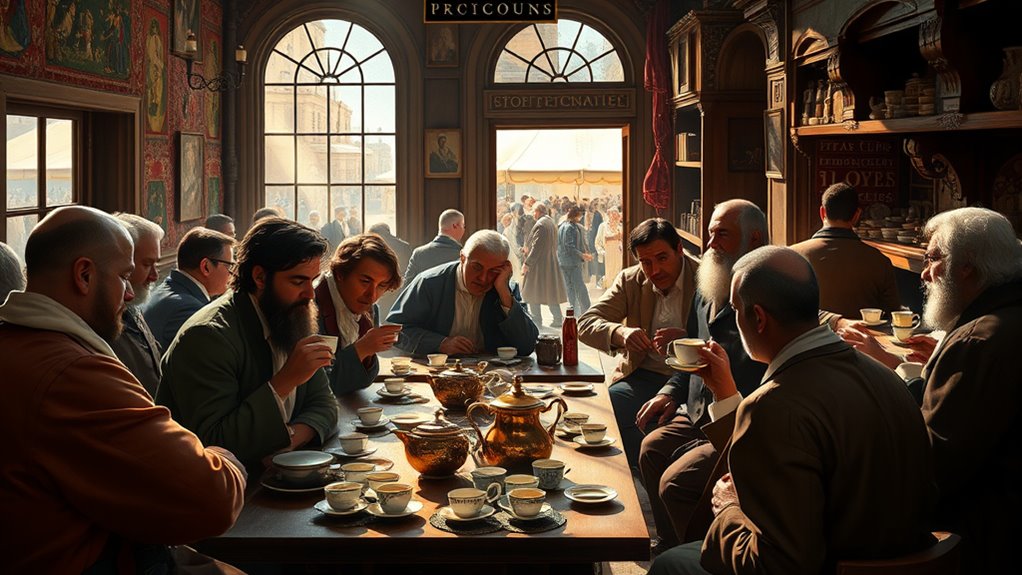During the Age of Exploration, coffee emerged as a crucial trade commodity that fueled economic growth and cultural exchange. Originating in Ethiopia, it spread to Europe and became integral to coffeehouses, where diverse ideas flourished and intellectual discussions sparked significant movements. Colonial powers established plantations, turning coffee into a lucrative cash crop. This beverage not only transformed social customs but also played an essential role in shaping global trade networks and identities. Discover how coffee’s journey shaped history.
Key Takeaways
- Coffee’s cultivation began in Yemen, fueling exploration and trade as demand surged in Europe during the 17th century.
- The establishment of coffee plantations in the Caribbean and South America was driven by European interest and economic motivations.
- The Dutch East India Company played a crucial role in expanding coffee trade routes by developing plantations in Indonesia.
- Gabriel de Clieu’s introduction of coffee seedlings to the Caribbean significantly enhanced coffee’s global reach and availability.
- The rise of coffeehouses fostered cultural exchange and intellectual discourse, influencing social and political movements during the Age of Exploration.
The Discovery of Coffee: From Ethiopia to the World

Coffee’s journey began in Ethiopia, where a goat herder named Kaldi noticed his goats buzzing with energy after munching on coffee cherries. This discovery sparked interest, leading to the first documented use of coffee as a brewed beverage in Yemen during the late 15th century.
Sufi religious societies embraced coffee, using it to enhance concentration during prayers. By the mid-16th century, coffee cultivation thrived in Yemen, with Mocha becoming a key trade hub.
As the drink spread to Europe in the 17th century, coffee houses popped up in cities like Venice and Paris, creating vibrant social scenes.
The 18th century saw Gabriel de Clieu transporting coffee seedlings to Martinique, paving the way for extensive coffee plantations in the Americas.
Coffee as a Catalyst for Trade and Exploration

Coffee sparked trade routes that transformed economies and cultures. As you explore how coffee fueled exploration, you’ll see its role in shaping global connections and driving economic motivations. The rise of coffeehouses also highlights the cultural exchanges that emerged alongside this beloved beverage. Additionally, various brewing methods influenced social interactions and the spread of coffee culture across different regions.
Coffee Trade Routes
A steaming cup of coffee has long been more than just a morning ritual; it’s also woven into the fabric of global trade and exploration.
Originating on the Arabian Peninsula, Yemen’s port city of Mocha became a hub for coffee trade in the 15th century. As coffee cultivation spread, the Dutch East India Company established plantations in Indonesia in 1699, expanding trade routes markedly.
By the late 17th century, coffeehouses in Europe emerged as vibrant meeting spots for merchants, fueling discussions that connected continents.
Gabriel de Clieu later introduced coffee seedlings to the Caribbean, leading to flourishing coffee plantations that became essential to trade networks.
This expansion of coffee trade routes shaped global commerce and attracted the attention of colonial powers.
Economic Motivations Behind Exploration
While exploring new territories, European powers quickly realized that coffee could drive economic growth and trade. The rising demand for coffee in Europe during the 17th century prompted them to seek reliable supply chains, leading to significant developments:
- Establishment of coffee plantations in coffee-growing regions like the Caribbean and South America.
- The Dutch East India Company’s role in facilitating trade in coffee and establishing Indonesian plantations.
- Brazil’s emergence as a key player in coffee production by the mid-19th century.
- The introduction of coffee seedlings to the Americas, transforming coffee into a lucrative cash crop.
Through colonial expansion, coffee became a powerful economic motivator, resulting in exploitation and reshaping trade dynamics in producing regions.
Cultural Exchange Through Coffee
As trade routes expanded, the allure of coffee transformed it into more than just a beverage; it became a catalyst for cultural exchange that connected diverse societies.
Coffee’s journey began in Ethiopia, reaching the Arabian Peninsula and later Europe, where it sparked significant cultural exchanges.
In the 17th century, public coffee houses emerged as popular social hubs, fostering intellectual discussions aligned with the Age of Enlightenment.
The Dutch expanded coffee cultivation to Indonesia, enhancing global trade networks.
Gabriel de Clieu’s introduction of coffee to Martinique further revolutionized coffee consumption in the Americas.
The Establishment of Coffeehouses: Centers of Exchange

Coffeehouses, which emerged in the 16th century, quickly became vibrant centers of exchange, drawing people together for social interaction and intellectual discourse.
These establishments played an essential role in the emergence of the public sphere, greatly impacting major social dynamics during the Age of Enlightenment.
Coffeehouses were pivotal in fostering the public sphere, significantly influencing societal dynamics during the Enlightenment era.
- They served as venues for the exchange of news and ideas.
- London coffeehouses, dubbed “penny universities,” allowed diverse classes to access knowledge.
- Notable political movements, including the planning of revolutions, sparked discussions within their walls.
- Writers and thinkers found a platform to share their works, fostering a culture of intellectual discourse.
Through these activities, coffeehouses shaped social change, making them integral to the fabric of society during this transformative period.
Coffee’s Cultural Significance in Different Societies

When you step into a coffeehouse, you’re entering a vibrant space where social interactions and intellectual exchanges flourish.
These hubs have shaped societies by fostering discussions that bridge diverse ideas and backgrounds.
From the Islamic world to 17th-century England, coffee’s role in connecting people has been pivotal in shaping cultural landscapes.
Social Interaction Spaces
Throughout history, coffee has played a pivotal role in shaping social interaction spaces across various cultures.
Coffeehouses emerged as essential social and intellectual hubs, particularly during the Age of Exploration. Here’s how they influenced society:
- In the Ottoman Empire, coffeehouses became popular venues for social interaction due to alcohol bans.
- London’s coffeehouses, known as penny universities, provided affordable access to knowledge and discussion, fueling the Enlightenment.
- These spaces contributed to the development of the public sphere, where ideas flourished beyond state or religious control.
- They also became hotbeds for revolutionary ideas, with significant events, like the French and American Revolutions, being planned within their walls.
Coffeehouses truly transformed how people connected and exchanged ideas.
Intellectual Exchange Hubs
While many might think of coffee merely as a morning ritual, it’s been a catalyst for intellectual exchange across diverse cultures.
During the Age of Exploration, coffeehouses emerged as essential hubs in major cities, where individuals gathered to foster dialogue. In the Ottoman Empire, these venues allowed the middle class to engage in discussions about politics and culture outside state control.
European coffeehouses, especially in London and Paris, became “penny universities,” offering patrons access to knowledge for the price of a cup. During the Enlightenment, they hosted figures like Voltaire and Rousseau, sparking debates that shaped societal reforms.
Furthermore, coffeehouses played significant roles in planning political movements, including the French and American Revolutions, by facilitating the exchange of revolutionary ideas.
The Economic Impact of Coffee on Colonial Powers

As coffee emerged as a highly coveted commodity during the Age of Exploration, colonial powers quickly recognized its potential to drive economic growth. The establishment of coffee plantations became a priority, shaping economies and trade routes.
You’d see:
- French colonies producing two-thirds of the world’s coffee, boosting their economy.
- Brazil becoming the largest coffee producer by 1852, essential for its national economy.
- The reliance on enslaved labor in Caribbean and Brazilian plantations, intertwining with the transatlantic slave trade.
- The global coffee trade generating immense revenue for colonial powers, making coffee a status symbol in consuming nations.
These factors illustrate how coffee not only influenced colonial economies but also left a lasting impact on global trade dynamics.
Coffee’s Influence on Social Movements and Intellectual Thought

How did coffee transform social interactions and intellectual thought during pivotal historical moments?
Coffeehouses emerged as vibrant venues for intellectual discourse during the Age of Enlightenment, where people from all walks of life gathered to share revolutionary ideas. These “penny universities” fostered a culture of democratic thought, contributing to significant social movements, including the French Revolution.
In the United States, the Boston Tea Party of 1773 catalyzed a shift to coffee as a patriotic beverage, reinforcing American identity and resistance to British rule.
As coffee became popular, it helped cultivate a public sphere essential for questioning traditional authority. Its stimulating effects encouraged longer discussions, making coffeehouses crucial for the development of modern democratic thought and activism.
Frequently Asked Questions
What Role Did Coffee Play in History?
Imagine sipping a warm cup of coffee while discussing revolutionary ideas with friends.
Coffee’s played a pivotal role in history, transforming social dynamics and fueling intellectual movements. It became a staple in coffeehouses, where debates sparked change and unity.
As demand grew, coffee cultivation led to global trade and colonial expansion, often tied to exploitation. You can see how this beloved beverage shaped cultures, economies, and even political landscapes throughout time.
What Role Did Coffee Play in the Columbian Exchange?
Coffee played an essential role in the Columbian Exchange, transforming agricultural practices and trade.
When you think of its introduction to the Americas, consider how Gabriel de Clieu brought seedlings to the Caribbean. This sparked the rise of coffee plantations, especially in Brazil, making it a major global commodity.
You’ll see that coffee cultivation not only boosted economies but also linked to the labor systems that emerged, intertwining coffee with the transatlantic slave trade.
What Role Did Coffee Play in the Enlightenment?
Coffee was the intellectual’s fuel, igniting conversations that sparked revolutionary ideas during the Enlightenment.
You’d find thinkers gathered in coffeehouses, exchanging thoughts on democracy and human rights, transforming society’s discourse. The drink’s stimulant properties sharpened minds, steering them away from alcohol-induced lethargy.
In these vibrant spaces, patrons from different backgrounds debated philosophy and politics, breaking down barriers and democratizing knowledge, ultimately shaping modern governance and inspiring change across Europe.
What Was the Cultural Significance of Coffee in the Medieval World?
In the medieval world, coffee wasn’t just a drink; it was a cultural catalyst. You’d find it at Sufi gatherings, heightening focus during prayers.
Coffeehouses sprang up as vibrant social hubs, where people from various backgrounds discussed politics, religion, and culture. This beverage fostered community and intellectual exchange, becoming integral to public life, especially in regions where alcohol was banned.
Its stimulating effects transformed social interactions and sparked creativity across the Islamic world.
Conclusion
In the grand tapestry of the Age of Exploration, coffee wasn’t just a drink—it was the fuel that ignited revolutions, sparked trade empires, and spawned a global obsession! Imagine bustling coffeehouses buzzing with ideas that shaped nations! This magical bean transformed societies, turned ordinary folks into intellectual titans, and sent colonial powers scrambling for control. Without coffee, who knows? The world might still be a sleepy, tea-drinking place, missing out on the vibrant, caffeinated culture we cherish today!









